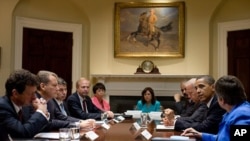In a meeting on Wednesday with President Barack Obama, BP executives agreed to create a $20 billion fund to compensate people and businesses harmed by the oil spill in the Gulf of Mexico. BP's chairman apologized for the worst environmental disaster in U.S. history, saying that BP is "fully aligned" with Mr. Obama and his administration on the need to stop the leak and compensate for damages.
After weeks of criticism that he should have held a face-to-face meeting with BP officials long ago, President Obama sat down with BP board chairman Carl-Henric Svanberg, Chief Executive Officer Tony Hayward, and other officials and company lawyers.
The meeting lasted far longer than expected. When he finally appeared before the media hours later, President Obama addressed the key outcome of the discussions.
"This $20 billion will provide substantial assurance that the claims people and businesses have will be honored. It is also important to emphasize this is not a cap [a maximum amount of money]," said President Obama. "The people of the Gulf have my commitment that BP will meet its obligations to them."
The independently-administered fund will be overseen by Kenneth Feinberg, the attorney who oversaw a fund that paid compensation to families of victims of the 2001 terrorist attacks on the United States
Calling the talks with BP "a good start," the president said the company also agreed to set aside $100 million to compensate oil workers who are unemployed because of the government-imposed ban on new offshore drilling.
Speaking to reporters outside the White House after the president, BP Chairman Svanberg announced that the company's board decided that the firm will not pay dividends for the rest of the year.
He issued an apology, saying that BP is determined to regain the public's trust.
"I would like to take this opportunity to apologize to the American people on behalf of all the employees in BP, many of whom are living on the Gulf coast," said Carl-Henric Svanberg. "And I do thank you for the patience that you have [had] in this difficult time."
Svanberg declined a specific answer when asked whether BP took safety shortcuts that contributed to the oil spill, saying only that the company is conducting a series of investigations. He added that BP's board of directors will conduct its own independent investigation to make sure that the root causes of the disaster are understood.
Addressing the nation on Tuesday night, President Obama said the Gulf oil spill demonstrates the need for improved regulation of the petroleum industry. He also made clear that he wants to mobilize the country and the U.S. Congress to commit to a new energy policy.
"For decades, we've talked and talked about the need to end America's century-long addiction to fossil fuels," said Mr. Obama. "And for decades, we have failed to act with the sense of urgency that this challenge requires. Time and again, the path forward has been blocked - not only by oil industry lobbyists, but also by a lack of political courage and candor."
With the president attempting to create political momentum to pass energy legislation, a version of which the House of Representatives already has approved, Mr. Obama's speech sparked a new round of criticism from opposition Republicans on Capitol Hill.
Senate Republican leader Mitch McConnell repeated criticism by members of his party that Mr. Obama is trying to use the Gulf oil disaster to advance his political agenda.
"I wish the president would have used this opportunity to focus entirely on stopping the spill and cleaning it up instead of using this crisis as an opportunity to push for a new national energy tax," said Mitch McConnell.
Republicans assert that energy and climate change legislation President Obama and Democratic lawmakers want amount to a tax - including a proposal for a "cap and trade" system to limit carbon emissions by creating a commodity market for them.
Democratic Senator Richard Durbin reflected feelings in Congress that BP should be prepared to pay long-term restitution for economic and environmental damages.
"I want to make certain that BP continues in business and meets its responsibility, that it sets aside the funds necessary to protect our nation from the damage which they have caused," said Richard Durbin.
With President Obama intensifying efforts to pass energy legislation, the White House announced a meeting next week between the president and a key group of Senate Democrats and Republicans next week.
The president's face-to-face meeting with BP officials came as the company announced it had set up a second containment system to capture leaking oil.
Government scientists say as much as 60,000 barrels of oil have been leaking from the damaged well - 50 percent more than earlier estimates.
Earlier, BP pledged to increase capture rates to more than 50,000 barrels by the end of June. But the new figures have increased concerns that the environmental damage caused by the spill will be even more severe before BP can complete relief wells in August.
Related video report by Mil Arcega:





